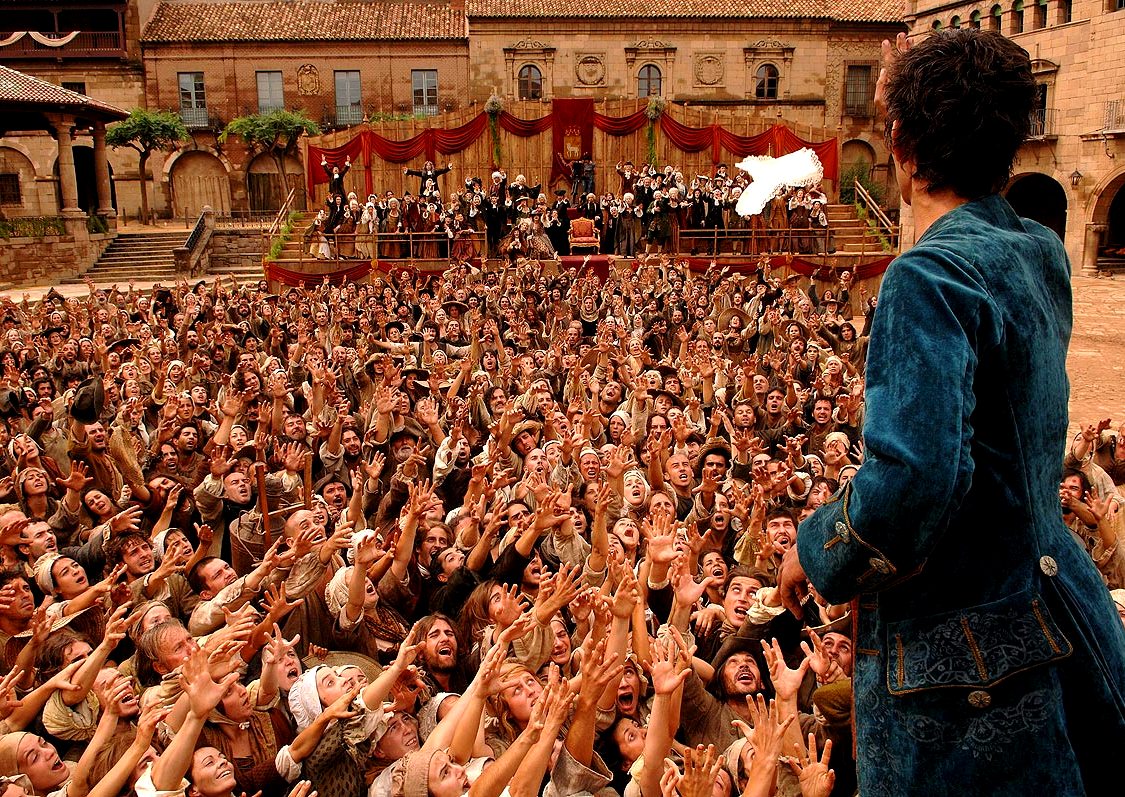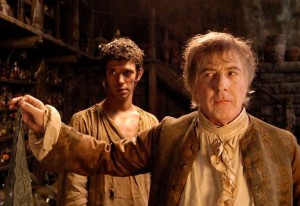
Strangely exquisite and spellbinding. Perfume: The Story of a Murderer is the great overlooked film of 2006. For twenty years various filmmakers have tried to breathe life into this story, one that is not as concerned for realism as it is obsessed with dark imagined fantasy. Patrick Suskind’s 1985 bestseller novel was passed along in movie script to master directors Stanley Kubrick and Milos Forman, both whom dabbled briefly with re-writes before passing on. It was deemed by them as “unfilmable.” After many delayed years, Tom Tykwer, the German filmmaker who attained fame with “Run Lola Run” (1999), insistently stepped up to adapt this difficult piece.
Hollowed-soul Jean-Baptiste Grenouille (Ben Whishaw, “Layer Cake”), who has a sublime gift for smell, is a murderer of women and a collector of their scents. What do you do with a character whose olfactory senses are so powerful that his transformative moods depend on what he is able to sniff out? Do you film the story from the nose’s point-of-view? To practically overcome such obstacles, the film uses John Hurt as a narrator to describe the protagonist’s scent sensations. And the film’s inflammatory imagery of 18th century proletariat France – rats, maggots and unwashed clothes worn on every poor body – has enough pungency to make us imagine the wicked whiff.
The major supporting roles are superbly played by Alan Rickman (“Die Hard’s” most popular villain) as wealthy aristocrat Antoine Richis whose ultimate ideal is to shield his beautiful daughter Laura (Rachel Hurd-Wood) from the world, so beautiful that she is one of France’s most sought after treasures. Also featured is Dustin Hoffman (channeling his period work from “Finding Neverland,” only improving on it) as fussy perfume-maker Giuseppe Baldini in the film’s most integral relationship.
 Jean Baptiste is a Mozart of perfume-making to Baldini’s Antonio Salieri. In their relationship, Baldini is supposed to play the role of mentor while Jean-Baptiste is supposed to be the protégé. Instead, Baldini gets a case of envy towards his student. Alas, things are learned in the apprenticeship, but the student must move on. Naturally for Jean Baptiste, that means moving on towards systematic murder of women in his quest for the perfect scent.
Jean Baptiste is a Mozart of perfume-making to Baldini’s Antonio Salieri. In their relationship, Baldini is supposed to play the role of mentor while Jean-Baptiste is supposed to be the protégé. Instead, Baldini gets a case of envy towards his student. Alas, things are learned in the apprenticeship, but the student must move on. Naturally for Jean Baptiste, that means moving on towards systematic murder of women in his quest for the perfect scent.
If I had been able to hand out the Academy Awards, I would have given a trophy to this film for Best Art Direction. Everything from the scales of sets to the array of props is a lustrous feast for the eyes. If you allow yourself to get sucked into this film, any true film fan can notice that Tykwer’s most obvious influence must have been the great Stanley Kubrick. In what feels like inspiration, Tykwer’s design is often Kubrickian in shot composition and staccato editing. And the rapturous Kubrickian ending has a building and escalating momentum, filled with extraordinary sights, unbelievable aura and mysterious wonder. Forget the nose. To the eyes, the film is nothing short of sumptuous.
147 Minutes. Rated R.
Film Cousins: “The Piano” (1993); “Orlando” (1993); “The Widow of St. Pierre” (2001, France); “The Illusionist” (2006).





